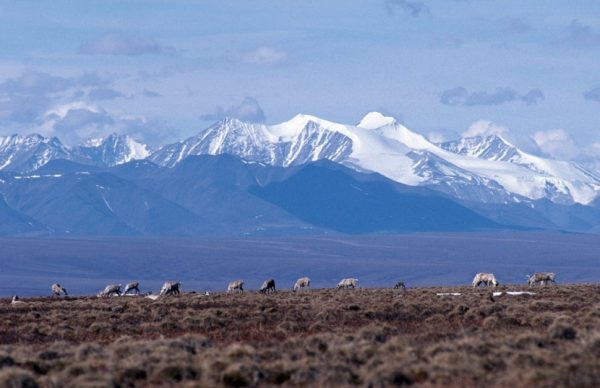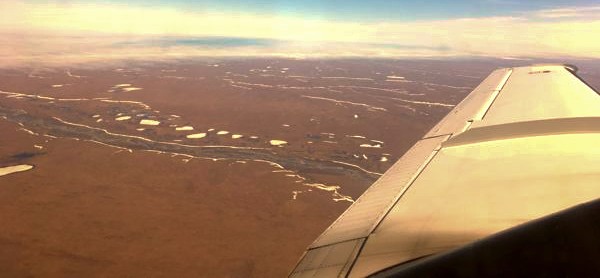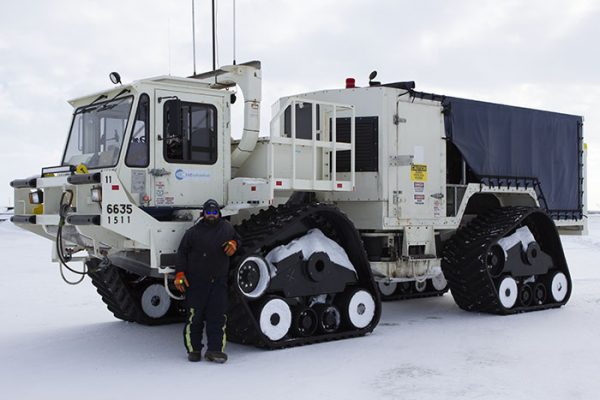
Last weekend, officials from the U.S. Interior Department said there would be no searching for oil in the Arctic National Wildlife Refuge this winter.
The reason: The Alaska Native corporation proposing to do it failed to meet a key Feb. 13 deadline to identify polar bear dens in the area, which could be threatened by the trucks used to detect underground oil formations, said the Interior.
Now, Kaktovik Inupiat Corp. is firing back, and it released a letter from federal officials that reveals the government had become overwhelmed with millions of public comments on the corporation’s proposed work.
In a strongly-worded statement Thursday, KIC said the Interior provided a “blatant mischaracterization” when it said the corporation had missed the deadline.
“It was the agency that ran the time out, not KIC,” said Nathan Gordon Sr., the corporation’s chairman.

‘They held all the cards’
KIC said it was blocked from making the flights to search for polar bear dens by Feb. 13 because it never got approval from the U.S. Fish and Wildlife Service, an Interior Department agency.
It blamed Fish and Wildlife’s “negligence, irresponsibility and failure to do its job” for thwarting its plans to search for oil this winter, which were largely targeting corporate-owned lands within the Arctic refuge’s boundaries.
“They held all the cards,” said Matthew Rexford, president of KIC, “and then we saw a lot of delays and excuses from them.”
Rexford, in a news release and six-page letter to Fish and Wildlife, is demanding an apology and correction from federal officials, saying they harmed KIC’s reputation and also caused significant economic loss for the corporation and the village of Kaktovik — the only community within the Arctic refuge’s boundaries.
An Interior Department official said the agency had no comment on KIC’s statement.
What KIC wanted to do this winter was bring the big trucks and dozens of workers onto a piece of the Arctic refuge’s coastal plain to search for pockets of oil using seismic technology.

A Republican-led Congress opened the Arctic refuge’s coastal plain to drilling in 2017 after decades of debate.
Much of the surface area within the coastal plain that KIC wanted to assess is owned by the corporation, with an affiliated regional Native corporation, Arctic Slope Regional Corp., holding rights to any oil under the ground.
But for the seismic testing to move forward, KIC needed approvals from the federal government, including an authorization for “incidental harassment” of polar bears in case the work disturbed any of the animals.
KIC originally applied to do the seismic tests under the Trump administration, which pushed for oil development in the Arctic refuge. But the administration didn’t make a decision on the request before Trump left office — leaving it to the anti-drilling administration of Joe Biden.
‘Extraordinary measures’
According to the Fish and Wildlife Service’s summary, KIC submitted its request for the polar bear authorization in August 2020, and then updated it in late October to include the flights to search for dens. A 30-day comment period on the request launched Dec. 8.
Some raised concerns early on in the process that the timeline was way too tight for KIC to start exploration this winter.
And then came TikTok.
Federal officials’ correspondence with KIC suggests that one reason the review for the authorization pushed beyond Feb. 13 was a campaign that popped up on the popular video-sharing app.
Video creators called on people to submit comments opposing KIC’s proposal to explore for oil this winter — their messages often playing over montages of polar bears and caribou. One activist even created an “influencer kit” to help other social media users promote the campaign.
In a letter Sunday to KIC, a Fish and Wildlife official pointed out that the agency received more than six million public comments by early January — a staggering amount. He said the agency could not review and consider all of the comments tied to the corporation’s request by the Feb. 13 flight deadline, despite taking “extraordinary measures.”
“These efforts included hiring a contractor to process and sort the comments, assembling a team of approximately 40 service staff members to review unique comments and working nights, weekends and holidays to ensure that all substantive comments were appropriately addressed,” the letter said.
KIC says that’s no excuse.
In a response letter, Rexford, with KIC, said the corporation expected approval by late January, which would have left more than enough time for the aerial surveys.
When that deadline seemed no longer possible, Rexford said, the corporation asked if it could do the flights without the harassment authorization and was told no.
“In other words, the service put KIC in an untenable situation where it could not perform a task without the service’s authorization, and then turned around and blamed KIC for the service’s failure to provide said authorization,” Rexford wrote.
KIC’s thwarted efforts to search for oil this winter are a major blow for proponents of drilling in the Arctic refuge. Any future proposals will likely face steeper hurdles under Biden’s administration.
RELATED: Biden immediately slams the brakes on oil drilling in Arctic refuge
Reach reporter Tegan Hanlon at thanlon@alaskapublic.org or 907-550-8447.




